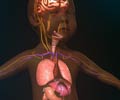Lysosomal storage disorders are genetic disorders that occur due to enzyme deficiency, this can be treated using repurposed drug, reveals study.

- Lysosomal storage disorder (LSD) is a genetic disorder which occurs due to the deficiency of certain metabolic enzymes.
- A research team from the University of Rochester found //repurposed drug to be effective in treating lysosomal storage disorder.
- Colforsin drug used for the treatment of cardiac disease was found to improve the quality of life in LSD patients.
Genetic disorders are mainly caused due to the abnormalities present in the genes. Lysosomal Storage disorders (LSD) are caused due to disruptions in the lysosome. Examples of Lysosomal storage disorders like Krabbe disease, Gaucher disease and other related conditions.
The research team led by Mark Noble Ph.D., found certain specific toxic waste products to be accumulated in lysosomal storage disorders causing multiple dysfunctions in cells. They also found repurposed drugs to have new treatment options for the disease.
Repurposed drugs are drugs that are being approved for other uses and were found to have unexpected new opportunities for treatment.
The research study was conducted by Christopher Folts, Ph.D., and Nicole Scott-Hewett, Ph.D., to know the biology behind lysosomal storage disorders.
They were able to reveal:
- Lysosomes to be more acidic like the stomach and the presence of toxic substances in the lysosome can disrupt the acidic environment.
- Drug treatment could be effective in maintaining the acidic environment of lysosome and helps to provide normal lysosome function.
Noble said, "One of the great challenges in these diseases is that they are both rare and come in many different varieties, and advances have tended to focus on single diseases."
The author also said that these results of the repurposed drug might improve the quality of life for children with severe genetic disorders.
Lysosomal Storage Disorders
- Lysosomal Storage Disorders are inherited metabolic disorders which occur due to the lack of a specific lysosomal enzyme
- The incidence of lysosomal storage disorders is around 1 in 5000 live births
- Symptoms for Lysosomal storage disorders include bone deformities, respiratory and cardiac difficulties, short stature, changes in the facial features and enlarged tongue, liver and spleen
- Enzyme assays, biopsy, genetic disorders and molecular analysis of cells or tissue helps to diagnose lysosomal storage disorders
- Mark Noble et.al. 'Lysosomal Re-acidification Prevents Lysosphingolipid-Induced Lysosomal Impairment and Cellular Toxicity'PLOS Biology; (2016) http://dx.doi.org/10.1371/journal.pbio.1002583
- About Lysosomal Diseases - ( http://www.ldnz.org.nz/lysosomal_diseases)
- INHERITED METABOLIC DISORDERS - (http://neuropathology-web.org/chapter10/chapter10aLSDgeneral.html)
Source-Medindia









